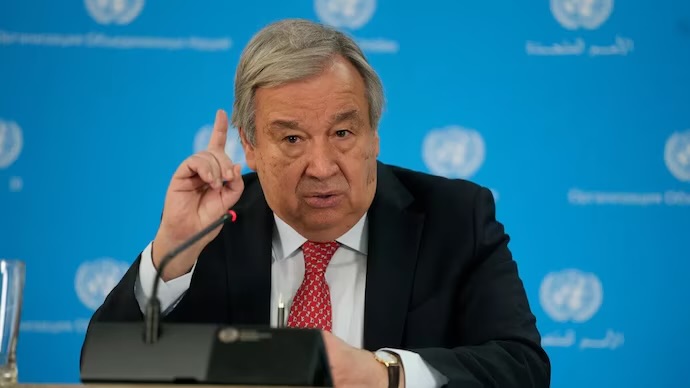Secretary-General Calls for Immediate Ceasefire in Gaza and Lebanon as Humanitarian Crisis Worsens
The situation in Gaza has entered a horrifying second year, marked by an array of crises: humanitarian, political, diplomatic, and moral. This devastating period began with the brutal terrorist attacks by Hamas on October 7th, leading to an unimaginable level of human suffering. Over 41,000 Palestinians, predominantly women and children, have reportedly been killed, and thousands more are missing, likely trapped under rubble. The entire population of Gaza has been displaced, and no area has been spared from the devastation.
The toll on journalists and humanitarians has been unprecedented. Many journalists have lost their lives in numbers unseen in modern conflicts, and those dedicated to humanitarian efforts, including numerous members of the UN family, have faced extraordinary dangers. A record number of these humanitarian workers have paid with their lives, especially those from UNRWA, the United Nations Relief and Works Agency for Palestine Refugees.
In light of this, UNRWA’s role has become even more critical and irreplaceable. The Secretary-General has expressed profound concern to Israeli Prime Minister Benjamin Netanyahu regarding draft legislation that could impede UNRWA’s essential work in the Occupied Palestinian Territory. Such a measure would exacerbate the already dire situation in Gaza and the entire region, leading to catastrophic consequences.
The proposed legislation would severely hinder the international humanitarian response in Gaza. UNRWA’s activities are integral to this response, and isolating one UN agency from others is not feasible. The legislation would disrupt coordination efforts crucial for protecting UN convoys, offices, and shelters that serve hundreds of thousands. Without UNRWA, the delivery of vital services like food, shelter, and healthcare would halt, and the education of 660,000 children in Gaza would be jeopardized, risking the future of an entire generation. Additionally, health, education, and social services in the occupied West Bank, including East Jerusalem, would also cease.
Such legislation would violate the UN Charter and Israel’s obligations under international law. National legislation cannot override these obligations. Politically, it would hinder sustainable peace efforts and a two-state solution, further destabilizing the region.
The situation in Gaza is deteriorating rapidly, especially in the north where military operations by Israel have intensified. Residential areas are being attacked, hospitals are ordered to evacuate, and basic necessities like electricity are cut off. Around 400,000 people are being forced to move south to overcrowded, polluted areas lacking essential survival resources. Families in places like the Jabalya refugee camp have faced repeated evacuations, highlighting a fundamental flaw in how this conflict is being conducted. Evacuations do not ensure safety if there are no safe places to go or adequate provisions.
International law is clear: civilians must be respected and protected, and their essential needs met through humanitarian assistance. All hostages must be released. The Secretary-General strongly condemns all violations of International Humanitarian Law in Gaza.
Southern Gaza is overwhelmed, with supplies running low and only one unsafe road for aid. Humanitarians face active hostilities and violent looting driven by desperation and the collapse of public order. The Secretary-General has repeatedly warned of the conflict’s potential to spread, turning the Middle East into a powder keg with numerous parties poised to ignite it.
The situation in the occupied West Bank is also critical, and attacks in Lebanon are escalating, threatening the entire region. Exchanges of fire between Hizbullah and other groups in Lebanon and the Israel Defense Forces have intensified, ignoring Security Council resolutions. Large-scale Israeli strikes into Lebanon, including Beirut, have killed over 2,000 people in the past year, with 1,500 deaths in the last two weeks alone. This death toll surpasses that of the 2006 Lebanon war. Hizbullah’s attacks south of the Blue Line have resulted in numerous casualties, and the conflict has displaced over one million people in Lebanon and forced 300,000 to flee to Syria. Over 60,000 people are displaced from northern Israel.
The IDF has begun incursions across the Blue Line, pushing the region to the brink of all-out war with devastating consequences. Respect for the sovereignty and territorial integrity of all countries is essential. UNIFIL peacekeepers in Lebanon continue to perform their duties under extremely challenging conditions, and their safety must be ensured by all parties.
The humanitarian situation in Lebanon requires urgent attention, with the US $426 million aid appeal only 12% funded. Donors need to step up their contributions.
The conflict in the Middle East is worsening, with every act of violence pushing peace further out of reach and increasing the suffering of millions of civilians. The Secretary-General calls for an immediate ceasefire in Gaza and Lebanon, the unconditional release of hostages, and the delivery of lifesaving aid. Efforts towards a two-state solution must continue, as all people in the region deserve to live in peace.
The Secretary-General answered questions about the ceasefire, emphasizing the need for a ceasefire in both Gaza and Lebanon, and expressed deep concerns about the safety of UNIFIL peacekeepers amid escalating tensions. The safety and security of peacekeepers and civilians must be a priority.

